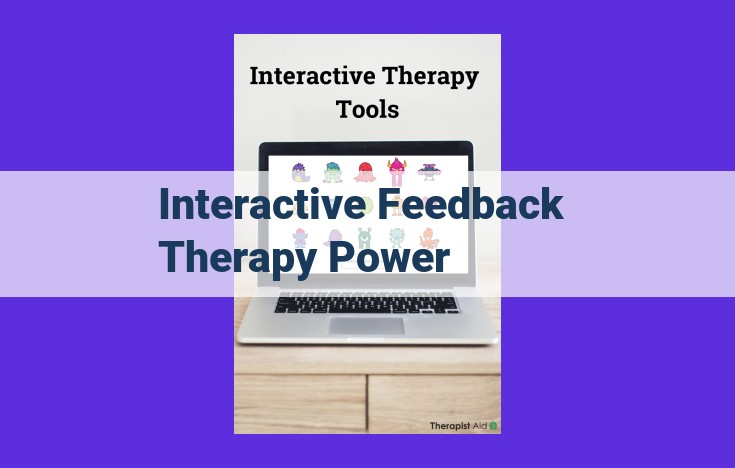Interactive feedback therapy harnesses the power of real-time feedback loops to empower individuals in their healing journeys. By fostering self-awareness and collaborative partnerships, this approach enables individuals to take control of their recovery process. From mental health to physical rehabilitation, its applications extend across various fields, facilitating transformative change through empowering individuals to actively participate in their own well-being.
- Define interactive feedback therapy and its applications in various fields.
Interactive Feedback Therapy: A Revolutionary Approach to Empowerment
Embrace the transformative power of interactive feedback therapy, a cutting-edge approach that empowers individuals in their journey toward healing and self-discovery. This groundbreaking therapy harnesses the principles of cybernetics and control theory to create a continuous feedback loop between the therapist and client, fostering a collaborative partnership that fosters growth and progress.
The Interactive Feedback Loop: A Dynamic Cycle
Imagine a system that constantly monitors itself, adjusting its actions based on the results it receives. This is the essence of the interactive feedback loop, a core concept in interactive feedback therapy. The therapist acts as a guide, providing feedback that prompts the client to reflect on their thoughts, emotions, and behaviors. Through this dynamic cycle, clients gain invaluable insights into themselves, empowering them to make informed decisions about their lives.
Therapy, Healing, and Empowerment
Interactive feedback therapy is not merely a therapeutic approach; it is a transformative experience. By empowering individuals with self-awareness and the ability to shape their own recovery process, this therapy empowers them to take ownership of their healing journey. It shifts the focus from external authority to internal strength, nurturing a sense of autonomy and self-determination.
The Interactive Feedback Loop: A Storytelling Guide to Cybernetics and Homeostasis
In the realm of interactive feedback therapy, the concept of the feedback loop is fundamental. It’s a dance of information and adjustment, much like the steady heartbeat of a healthy body. To unravel this concept, let’s embark on a storytelling journey into the world of cybernetics and homeostasis.
Cybernetics, a field that marries biology and technology, introduces us to feedback loops. Imagine a heating system that receives real-time information about the room’s temperature. When the temperature drops, the system kicks into gear, sending heat until the desired temperature is reached. This constant monitoring and adjustment ensure optimal conditions.
Homeostasis, the body’s ability to maintain a balanced internal environment, is another fascinating application of feedback loops. For instance, our thirst mechanism drives us to drink when dehydrated. This thirst, a feedback signal, prompts the body to replenish its water levels, restoring balance.
Feedback loops, therefore, are crucial for keeping systems stable and responsive. Whether in technology, biology, or therapy, they play a vital role in empowering individuals to achieve well-being and optimal functioning.
Therapy, Healing, and Empowerment: The Power of Interactive Feedback
In the realm of therapy, where individuals embark on transformative journeys towards healing, interactive feedback therapy emerges as a potent tool that empowers clients in their recovery process. This approach embraces the cyclical exchange of information between therapist and client, creating a dynamic feedback loop that fosters growth and empowerment.
By engaging in interactive feedback therapy, individuals gain invaluable insights into their thoughts, feelings, and behaviors. This self-awareness becomes the foundation for informed decision-making, empowering clients to take ownership of their recovery journey. Therapists serve as guides, facilitating the flow of information and empowering clients to recognize their strengths, identify areas for improvement, and ultimately achieve their therapeutic goals.
Empowerment in therapy extends beyond self-awareness. Interactive feedback encourages clients to actively participate in the therapeutic process, sharing their perspectives, and contributing to the development of treatment plans. This collaborative approach fosters a sense of agency and ownership, empowering clients to make choices that align with their values and aspirations.
Through the transformative power of interactive feedback therapy, clients can break free from cycles of self-doubt and reclaim their sense of control. They cultivate a deep understanding of themselves, their needs, and their potential. Empowered individuals navigate life’s challenges with greater resilience, embracing a newfound sense of purpose and direction.
Power in Therapy: Authority, Influence, and Control
In the realm of interactive feedback therapy, power dynamics play a crucial role in shaping the therapeutic process. Authority, influence, and control are three key aspects that can significantly impact the outcomes of therapy.
Authority
Authority refers to the power or influence that one individual has over another. In the therapeutic context, the therapist typically holds a position of authority due to their expertise and experience. However, it is important to recognize that this authority should not be used to control or dominate the client.
Influence
Influence is the ability to affect or change the behavior or thoughts of another person. Therapists can use their influence to guide clients towards positive change, but they must do so in a respectful and ethical manner. Empowering clients rather than controlling them should be the primary objective.
Control
Control is the ability to direct or restrict the actions or behavior of another individual. While it may be necessary in certain situations, excessive control in therapy can stifle growth and autonomy. Instead, therapists should aim to create a collaborative partnership where clients feel ownership over their recovery journey.
The Importance of Collaborative Partnerships
Recognizing and effectively managing power dynamics is essential for fostering collaborative partnerships in interactive feedback therapy. When therapists and clients work together as equals, a sense of mutual trust and respect is established. This creates an environment that is more conducive to healing and growth.
By understanding the power dynamics inherent in therapy and embracing collaborative approaches, therapists can empower clients to take an active role in their recovery process. This ultimately leads to more effective and sustainable outcomes.
Applications of Interactive Feedback Therapy Power
Mental Health
Interactive feedback therapy has proven to be a powerful tool in the field of mental health. It empowers individuals struggling with anxiety, depression, and other mental health challenges to engage in a collaborative feedback loop with their therapists. Therapists provide tailored feedback based on the client’s experiences, thoughts, and emotions. This real-time feedback helps clients identify patterns, challenge negative beliefs, and develop coping mechanisms. By enhancing self-awareness and empowering clients with decision-making tools, interactive feedback therapy fosters resilience and promotes lasting healing.
Physical Rehabilitation
In the realm of physical rehabilitation, interactive feedback therapy plays a crucial role in assisting individuals in regaining mobility, function, and independence. Through targeted exercises and personalized feedback mechanisms, therapists guide clients through specific movements and provide feedback on their progress. This continuous feedback loop empowers clients to monitor their own performance, adjust their techniques, and enhance their recovery journey. By fostering self-awareness and promoting a sense of agency, interactive feedback therapy accelerates rehabilitation and empowers individuals to achieve their physical goals.
Organizational Development
Interactive feedback therapy has also made significant inroads into the world of organizational development. It empowers teams and organizations to engage in meaningful feedback exchanges that foster collaboration, improve decision-making, and enhance productivity. By establishing feedback mechanisms that allow individuals to provide and receive feedback in a constructive and timely manner, organizations create a culture of continuous improvement and innovation. This ongoing feedback loop strengthens communication channels, promotes transparency, and empowers employees to contribute actively to the organization’s growth and success.
Benefits and Limitations of Interactive Feedback Therapy
Benefits:
- Empowerment and Self-Awareness: Interactive feedback therapy puts individuals in control of their recovery journey, empowering them with self-awareness, decision-making skills, and a deeper understanding of their own therapeutic process.
- Adaptive and Personalized: The iterative nature of interactive feedback loops allows for tailored therapies that adapt to individual needs, ensuring a highly personalized and effective experience.
- Improved Communication: Interactive feedback enhances communication between therapists and clients, facilitating open dialogue and a collaborative approach to goal-setting and progress tracking.
- Enhanced Motivation and Engagement: The interactive and dynamic nature of this approach fosters increased motivation and engagement, as individuals feel more invested in their own progress and recovery.
Limitations:
- Technological Dependency: Interactive feedback therapy relies on access to technology, which may not be available to all individuals in certain settings or with varying levels of digital literacy.
- Potential Skepticism: Some individuals may initially resist interactive feedback approaches, as they may require a shift in mindset from traditional therapy models.
- Time and Resource Requirements: Interactive feedback therapy typically requires more time and resources than traditional therapies, which may not be suitable for individuals with busy schedules or limited financial means.
- Potential for Misinterpretation: In some cases, individuals may misinterpret or misapply feedback, leading to confusion or setbacks in their progress.
Empowering Transformation through Interactive Feedback Therapy
Embark on a profound journey of empowerment and personal growth with Interactive Feedback Therapy (IFT). This innovative approach weaves together the power of therapy with real-time, interactive feedback mechanisms, unlocking transformative potential within you.
IFT empowers you to become an active participant in your own healing process. Through continuous feedback, you gain valuable insights into your thoughts, emotions, and behaviors. This self-awareness is the catalyst for meaningful change, as you learn to identify patterns, make informed decisions, and forge a path towards a more fulfilling life.
The interactive feedback loop is the cornerstone of IFT. It mirrors the principles of cybernetics and control theory, where systems continuously adjust and adapt based on feedback. In the context of therapy, this loop empowers you to take ownership of your growth, as you navigate challenges, celebrate successes, and refine your strategies with the guidance of your therapist.
IFT invites you to reclaim your power in the therapeutic relationship. It redefines authority and control, emphasizing the importance of a collaborative partnership. Your therapist becomes a facilitator, empowering you with the tools and support you need to unlock your potential.
From the realm of mental health to the dynamic field of organizational development, IFT has made its mark in various settings. In physical rehabilitation, for example, interactive feedback empowers individuals to monitor their progress, adjust their techniques, and ultimately accelerate their recovery.
The benefits of IFT are multifaceted. It promotes self-awareness, enhances decision-making skills, and fosters a sense of control. While it is not without its limitations, IFT remains a valuable tool for personal growth and empowerment.
Embrace the transformative power of Interactive Feedback Therapy. Let it guide you on a journey of self-discovery, healing, and empowerment. With every step forward, you become an active agent in shaping your own destiny, creating a life filled with purpose, meaning, and well-being.




